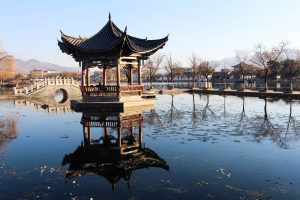 Just after the border, a 20yo couple stops and invites us for dinner. We spend our first days in China with them, in a community organized around a basketball field, and surrounded by banana plantations. Each family living there wants to invite us for a meal and our appetite has to follow the rhythm, moreover they seem to eat 4 times a day in the area.
Just after the border, a 20yo couple stops and invites us for dinner. We spend our first days in China with them, in a community organized around a basketball field, and surrounded by banana plantations. Each family living there wants to invite us for a meal and our appetite has to follow the rhythm, moreover they seem to eat 4 times a day in the area.
The new year is coming: everybody is on holiday for at least 3 weeks and the pig has been killed to feed all these people. We enjoy the food and the smiles and we learn how to play with Google translate to talk to our hosts.
It’s also from this moment it is confirmed how important is the cigarette in China. They offer some to us or their friends every 5′, some shops give it for free to attract customers and for instance at the weddings some cups full of it are displayed at the entrance.
Our trip to Kunming starts at the toll where a policeman stops cars for us. He finds one after a long discussion and we don’t know if our driver was somehow forced to take us… Whatever, the guy was nice and we could exchange a little bit on the road.
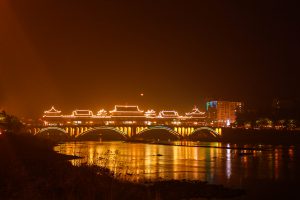 The first Chinese landscapes are huge, the first villages are cities, where tall buildings are aligned along the roads. The infrastructures are impressive and our map is not up to date anymore, the concrete is still warm and the roads are bright.
The first Chinese landscapes are huge, the first villages are cities, where tall buildings are aligned along the roads. The infrastructures are impressive and our map is not up to date anymore, the concrete is still warm and the roads are bright.
After Kunming, a city where everything seems so recent, we go to Dali. It is one of the most touristic city of China and we discover there the importance of interior tourism in China. A family from Canton takes us there, they did more than 1500 kms to reach Dali. From Dali we are on average at 2200m of altitude and the road often reaches 3000m. The faces and the clothes of the local ethnics change a lot, languages, food and landscapes too, and we realize how diversified China is. It is more than a country.
We sleep for the first time under 0 degree in the tent, and we almost reach the limit of our equipment. The coldness being more important in the morning, our fingers are frozen when we fold the tent. We try from then on not to sleep outside, and we directly ask people on the street if they can host us. The day after we sleep in a building belonging to a Christian church, then in a shop etc.
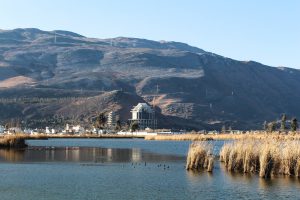 One of the village where we sleep is specialised in silver crafting for several centuries. And even if few houses or temples seem old, this quite touristic place is keeping some charm and its village soul. It was the same in Dali, and it seems that tourism doesn’t change that much the cities and the people.
One of the village where we sleep is specialised in silver crafting for several centuries. And even if few houses or temples seem old, this quite touristic place is keeping some charm and its village soul. It was the same in Dali, and it seems that tourism doesn’t change that much the cities and the people.
We spend a night in the suburb of a mountain city, Shuanghe, with a family belonging to the local ethnicity. At the light of a fire we eat potatoes cooked in the ash and we chat with the brothers, sisters and cousins some of them talking a quite good English. We are till now really impressed by the welcoming spirit of Chinese people and how they are proactive.
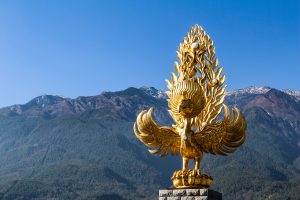 In Chengdu we spend the new year with a family, in Xin Du district. We are warmly welcomed, again, and we enjoy the sound of firecrackers and the fireworks popping from everywhere around us. These are more or less forbidden in Chengdu center but not here. We visit a big Chinese temple full of people, and we throw the incense in the fire before sending some balloons in the night. In the morning the firecrackers sing again.
In Chengdu we spend the new year with a family, in Xin Du district. We are warmly welcomed, again, and we enjoy the sound of firecrackers and the fireworks popping from everywhere around us. These are more or less forbidden in Chengdu center but not here. We visit a big Chinese temple full of people, and we throw the incense in the fire before sending some balloons in the night. In the morning the firecrackers sing again.
In Sichuan province the food is spicy but not as much as in Indonesia, or differently we cannot say. Whatever we try new tastes, unknown vegetables and meat, some buckwheat tea, green tea, strange sweet and salty crackers etc.
We are now in Mianyang with so much to tell, but we have no time to describe all that we discover here. Days are short while travelling…
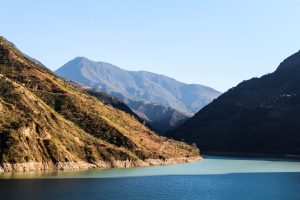 We will soon buy gloves and hats to fight the minus temperatures of the North. Pollution is visible too but our nose gets cold and we cannot feel it. People warn us regularly about the sand storms between Urumqi and Beijing, we’ll see. To go there when everything is fine wouldn’t it be cheating ? Till some limits 😉
We will soon buy gloves and hats to fight the minus temperatures of the North. Pollution is visible too but our nose gets cold and we cannot feel it. People warn us regularly about the sand storms between Urumqi and Beijing, we’ll see. To go there when everything is fine wouldn’t it be cheating ? Till some limits 😉
Happy Chinese new year! May the roosters wake everybody up!
Leave a Comment
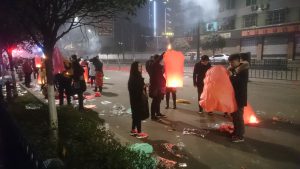 Unfortunately this travel on the highways and the nights in the huge chinese “villages” prevent us to take pictures. Again, everything is new and our hosts sometimes complain, talking about Beijing and Xi’an where some old districts are still preserved. In Longnan we ask in a shop if they know where we can stay, the beginning of a long serie. We finally find a church besides the city on a mountain’s side. We discover there the electric mattress for the first time, an amazing invention to keep you warm. Sometimes it’s replaced by a huge tank of warm water under the bed.
Unfortunately this travel on the highways and the nights in the huge chinese “villages” prevent us to take pictures. Again, everything is new and our hosts sometimes complain, talking about Beijing and Xi’an where some old districts are still preserved. In Longnan we ask in a shop if they know where we can stay, the beginning of a long serie. We finally find a church besides the city on a mountain’s side. We discover there the electric mattress for the first time, an amazing invention to keep you warm. Sometimes it’s replaced by a huge tank of warm water under the bed.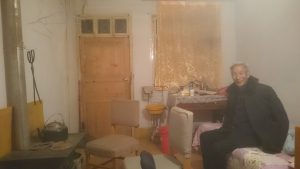 In Lanzhou we are luckier. Close to a mosquee a woman and two siblings take care of us, we talk through the translators of our phones and we rest in a nice muslim house of the suburbs.
In Lanzhou we are luckier. Close to a mosquee a woman and two siblings take care of us, we talk through the translators of our phones and we rest in a nice muslim house of the suburbs.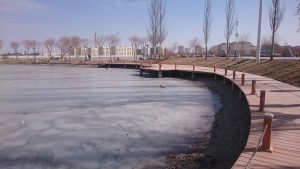 In Yumen, a driver welcome us in his home, and his hospitality gives us some energy. He tells us how Chinese from the North West are reluctant to invite strangers to their home, but when the ice is broken they are really nice, actually taking care of us as we were relatives. We stay a second day in Yumen with a friend of our host in Lanzhou. It is cold, far under zero, but we are happy to visit the city and to finally enjoy some free time. It was an old town of the silk road, and around is the oldest oil field of China.
In Yumen, a driver welcome us in his home, and his hospitality gives us some energy. He tells us how Chinese from the North West are reluctant to invite strangers to their home, but when the ice is broken they are really nice, actually taking care of us as we were relatives. We stay a second day in Yumen with a friend of our host in Lanzhou. It is cold, far under zero, but we are happy to visit the city and to finally enjoy some free time. It was an old town of the silk road, and around is the oldest oil field of China.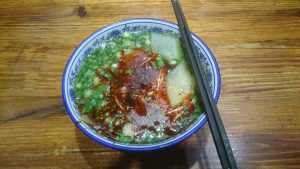 In Hami and Turpan, we finally find some hosts on the street, quite easily, and we can talk and recover. We got experience, or luck.
In Hami and Turpan, we finally find some hosts on the street, quite easily, and we can talk and recover. We got experience, or luck.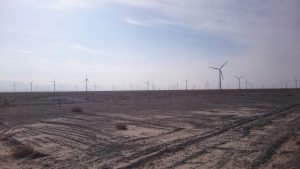 China gave us a mitigated impression about the proactiveness and the hospitality of people. But our way of travelling is weird enough, so we understand their surprise and the misunderstandings, even if in other countries we did not have the same issues. On our side we tried not to use charity, trying as much as possible to be hosted spontaneously, but the task was hard. If we are quite stubborn not to stay in hostels in spite of the cold weather, it is to force ourselves to ask people and somehow to test the welcoming spirit and the character of the local people. It’s also a way to meet people of any condition and culture, and to discover atypical places. We would definitely use the tent if it was not -15 degree by night, the hitchhiking being already a big challenge under these conditions. The adventure will now go on in Central Asia!
China gave us a mitigated impression about the proactiveness and the hospitality of people. But our way of travelling is weird enough, so we understand their surprise and the misunderstandings, even if in other countries we did not have the same issues. On our side we tried not to use charity, trying as much as possible to be hosted spontaneously, but the task was hard. If we are quite stubborn not to stay in hostels in spite of the cold weather, it is to force ourselves to ask people and somehow to test the welcoming spirit and the character of the local people. It’s also a way to meet people of any condition and culture, and to discover atypical places. We would definitely use the tent if it was not -15 degree by night, the hitchhiking being already a big challenge under these conditions. The adventure will now go on in Central Asia!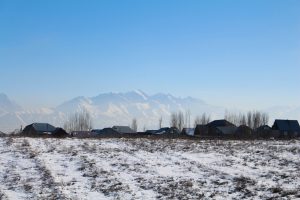 In Urumqi we learn some details about Uygur and Han relationship. For instance, the administration staff has to do a one-year internship in a Uygur village, and should bring regularly some small gifts to the welcoming family. There are also free apartments and jobs available for Han people who want to settle in Xinjiang province, and so many policemen and checking points everwhere. These policies started in 2009 when thousands of Han and Uygur fought with each other.
In Urumqi we learn some details about Uygur and Han relationship. For instance, the administration staff has to do a one-year internship in a Uygur village, and should bring regularly some small gifts to the welcoming family. There are also free apartments and jobs available for Han people who want to settle in Xinjiang province, and so many policemen and checking points everwhere. These policies started in 2009 when thousands of Han and Uygur fought with each other.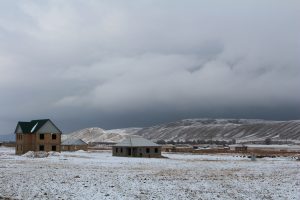 The cold wind is biting us but we finally find two nice guys who bring us to their flat. Actually they are… Policemen. We have a nice evening with local food and Wusu beer, made in a village close by.
The cold wind is biting us but we finally find two nice guys who bring us to their flat. Actually they are… Policemen. We have a nice evening with local food and Wusu beer, made in a village close by.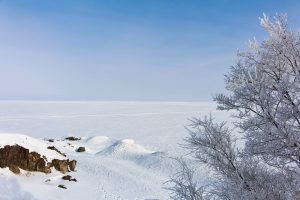 However we find our host with the first try. Arcadi is a Moldavian agronome in mission in the oblast. Not talkative but really nice, we ask him if they drink teaor coffee there in Moldavia and he replies “I drink all liquid”. No comment.
However we find our host with the first try. Arcadi is a Moldavian agronome in mission in the oblast. Not talkative but really nice, we ask him if they drink teaor coffee there in Moldavia and he replies “I drink all liquid”. No comment.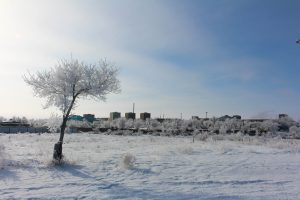 It’s infinite steppe, all frozen. The temperature falls down to -20°C by night.
It’s infinite steppe, all frozen. The temperature falls down to -20°C by night.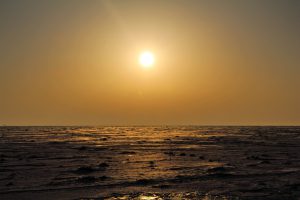 In Shu we sleep in an Orthodox church with the night guards and we also share stories quickly with a nice bearded pope. Then we go to Korday, we eat there and finally sleep in the house of the restaurant owners. Their son is really curious about our culture and way of travelling and we have nice talks with him.
In Shu we sleep in an Orthodox church with the night guards and we also share stories quickly with a nice bearded pope. Then we go to Korday, we eat there and finally sleep in the house of the restaurant owners. Their son is really curious about our culture and way of travelling and we have nice talks with him.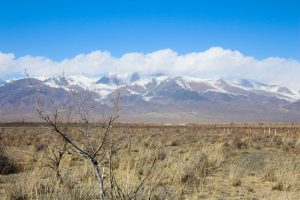 We learn some stories about Kyrgyzstan, Manas epic verses, kidnapping of brides which hopefully tends to disappear, or the role of Kyrgyz people during World War 2. There are also the movements of population in old and recent history, the nomad games and dances, the yurts in the spring, the animal fighting, which displays a powerful culture strenghtened by the developing tourism. Unfortunately for us, most of these cultural activities happen during spring and summer.
We learn some stories about Kyrgyzstan, Manas epic verses, kidnapping of brides which hopefully tends to disappear, or the role of Kyrgyz people during World War 2. There are also the movements of population in old and recent history, the nomad games and dances, the yurts in the spring, the animal fighting, which displays a powerful culture strenghtened by the developing tourism. Unfortunately for us, most of these cultural activities happen during spring and summer.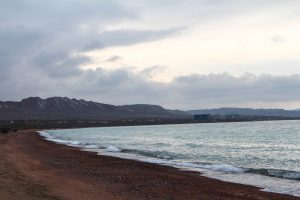 Karakol is not really welcoming, some alcoholic guys and junkies try to fight with us, but are fortunately easily pushed away. Besides this, tourism is omnipresent. We sleep in a worker’s home with a young guy, but he tries to get some money in the morning. It is as sad as it’s not representative of the kindness we found in the small villages and among the drivers. The next day we are welcomed in a mosque in a small village embedded between the lake and a cliff. We talk about Islam with a dozen guys, we share our meal with the imam and finally sleep in one of their houses.
Karakol is not really welcoming, some alcoholic guys and junkies try to fight with us, but are fortunately easily pushed away. Besides this, tourism is omnipresent. We sleep in a worker’s home with a young guy, but he tries to get some money in the morning. It is as sad as it’s not representative of the kindness we found in the small villages and among the drivers. The next day we are welcomed in a mosque in a small village embedded between the lake and a cliff. We talk about Islam with a dozen guys, we share our meal with the imam and finally sleep in one of their houses.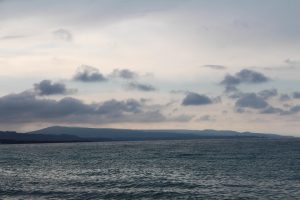 Another delay to get Iranian visa threaten our own trip through Uzbekistan, whose visa dates are fixed, but we can finally get the visa in one day thanks to the Consul agreement.
Another delay to get Iranian visa threaten our own trip through Uzbekistan, whose visa dates are fixed, but we can finally get the visa in one day thanks to the Consul agreement.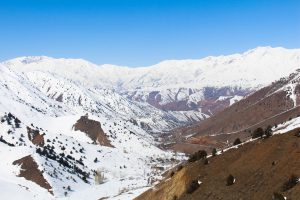 The pass in the south of Bishkek is hidden by an icy fog. An impressive quantity of snow is piled along the road. This winter some drivers lost their life or some body parts in this place, by minus 50 degrees. We are lucky the weather is better now, and the dangerous beauty of the mountains follows us on our way to Osh. We sleep on the road with one of our drivers, a fruit and vegetable wholesaler. We eat plov and homemade bread with his family, watched closely by curious children. On the hills there you can see so many shepherds accompanying their herd on their horses’ back. Then we go to Osh and we cross the border easily, even if it’s the first border where they check all our stuff. Welcome to the Uzbek over secured society!
The pass in the south of Bishkek is hidden by an icy fog. An impressive quantity of snow is piled along the road. This winter some drivers lost their life or some body parts in this place, by minus 50 degrees. We are lucky the weather is better now, and the dangerous beauty of the mountains follows us on our way to Osh. We sleep on the road with one of our drivers, a fruit and vegetable wholesaler. We eat plov and homemade bread with his family, watched closely by curious children. On the hills there you can see so many shepherds accompanying their herd on their horses’ back. Then we go to Osh and we cross the border easily, even if it’s the first border where they check all our stuff. Welcome to the Uzbek over secured society!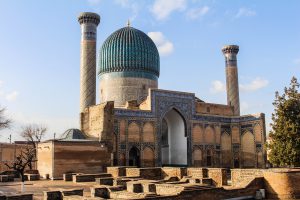 The next two days we are picked up by two Uzbek trucks to Nukus. We sleep on the truck’s couch, something we can add to our “first time” list. Villages are now replaced by a huge desert, where our eye catches some eagles, camels and small mammals. We move out of of Nukus, sleeping in a shepherd shelter and hit the road again, still surrounded by the dry land. We meet some young guys working in a restaurant, dreaming about travels, and eager to welcome cyclists and hitchhikers. After we try to continue but we are blocked by a sand storm, which forces us to sleep in a building under construction.
The next two days we are picked up by two Uzbek trucks to Nukus. We sleep on the truck’s couch, something we can add to our “first time” list. Villages are now replaced by a huge desert, where our eye catches some eagles, camels and small mammals. We move out of of Nukus, sleeping in a shepherd shelter and hit the road again, still surrounded by the dry land. We meet some young guys working in a restaurant, dreaming about travels, and eager to welcome cyclists and hitchhikers. After we try to continue but we are blocked by a sand storm, which forces us to sleep in a building under construction.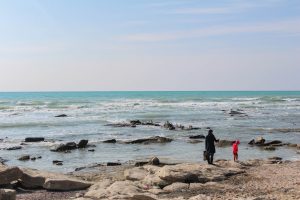 In Aktau we spend 3 nights with an host and his family, we discover Caspian sea and finally jump in the ferry to Baku. We stay awake 40 hours in a row due to the lack of organization, fortunately the owner of the harbour’s cafe offers us some food, tea and company. The boat stays out of the harbour 20 hours before the little waves and the wind calm down and allow him to reach the deck.
In Aktau we spend 3 nights with an host and his family, we discover Caspian sea and finally jump in the ferry to Baku. We stay awake 40 hours in a row due to the lack of organization, fortunately the owner of the harbour’s cafe offers us some food, tea and company. The boat stays out of the harbour 20 hours before the little waves and the wind calm down and allow him to reach the deck.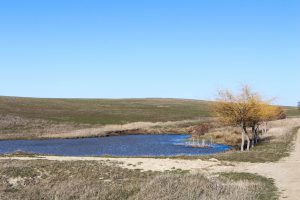 In the morning we go to Salyan after some detour to see higher mountains. Dozens of cafe are built along the road, with shelters where families enjoy some barbecues.
In the morning we go to Salyan after some detour to see higher mountains. Dozens of cafe are built along the road, with shelters where families enjoy some barbecues.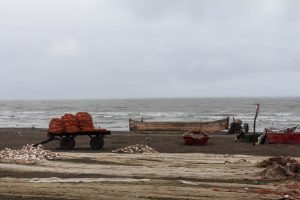 The first Iranian police we meet at the border are awesome, they gather around us to shake our hands and they wish us a nice stay in their country with broad smiles. An English speaking soldier takes care of us all the way till our visa is checked. If we should note the borders we cross, this one wins.
The first Iranian police we meet at the border are awesome, they gather around us to shake our hands and they wish us a nice stay in their country with broad smiles. An English speaking soldier takes care of us all the way till our visa is checked. If we should note the borders we cross, this one wins.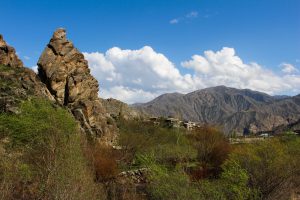 We couldn’t find Internet for a while, sorry for the absence of news. The Iranians don’t have unlimited wifi, they have to pay for each gigabyte, which they rarely do.
We couldn’t find Internet for a while, sorry for the absence of news. The Iranians don’t have unlimited wifi, they have to pay for each gigabyte, which they rarely do.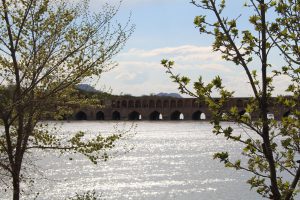 Then, Shiraz and more deserts. We sleep in the tent not far from the city. During the day we visit the bazaar, the citadel and the narrow streets of the center. While eating in a park we meet a man working in the Iranian stock exchange. He explains us their inflation issues and the lack of investment in the country, and gives us some fried food he was carrying home. The food is good, Iranian situation less.
Then, Shiraz and more deserts. We sleep in the tent not far from the city. During the day we visit the bazaar, the citadel and the narrow streets of the center. While eating in a park we meet a man working in the Iranian stock exchange. He explains us their inflation issues and the lack of investment in the country, and gives us some fried food he was carrying home. The food is good, Iranian situation less.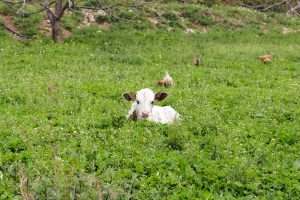 We reach Bushehr the next day, but after we watch the Persian sea (Arabic) and we drink some tea and we go back to sleep in an oasis among the date palms.
We reach Bushehr the next day, but after we watch the Persian sea (Arabic) and we drink some tea and we go back to sleep in an oasis among the date palms.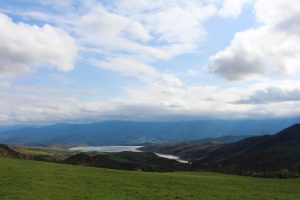 We are ungrateful in a country where being in a hurry is nonsense. However if we don’t fix a rhythm we would need one year for the same trip.
We are ungrateful in a country where being in a hurry is nonsense. However if we don’t fix a rhythm we would need one year for the same trip.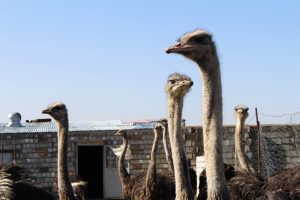 Another night and the sunshine comes back. We feed the ostriches, they bite our fingers affectionately and we finally have to leave our two nice hosts, Reza and Muhammad.
Another night and the sunshine comes back. We feed the ostriches, they bite our fingers affectionately and we finally have to leave our two nice hosts, Reza and Muhammad.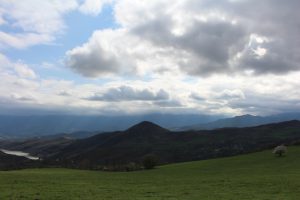 We first sleep in Meghri, in the warehouses of the city, after we talk to the guard and we eat in his small room. The next night we stay in Goris in a French armenian hospital, with authorization of the director. However we wake up two times with the sound of ambulances, such an atmosphere!
We first sleep in Meghri, in the warehouses of the city, after we talk to the guard and we eat in his small room. The next night we stay in Goris in a French armenian hospital, with authorization of the director. However we wake up two times with the sound of ambulances, such an atmosphere!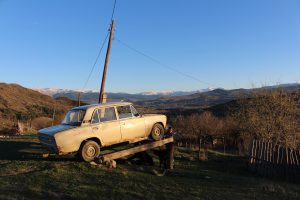 Unfortunately it is a short stay in Caucasia. We fixed our deadline the 30/04 and the road is still long to reach Istanbul. We therefore move to Georgia and sleep in our tent in Akhalkalaki, and the next day with hosts in a farm close to Adigeni. Everybody is in the field to plant potatoes, and we could also observe some neighbours repairing an old Lada car. Same model since the beginning of USSR, only maybe minor changes on the wing mirrors. Local people don’t stop doing jokes about this brand, as much as we do in western Europe.
Unfortunately it is a short stay in Caucasia. We fixed our deadline the 30/04 and the road is still long to reach Istanbul. We therefore move to Georgia and sleep in our tent in Akhalkalaki, and the next day with hosts in a farm close to Adigeni. Everybody is in the field to plant potatoes, and we could also observe some neighbours repairing an old Lada car. Same model since the beginning of USSR, only maybe minor changes on the wing mirrors. Local people don’t stop doing jokes about this brand, as much as we do in western Europe.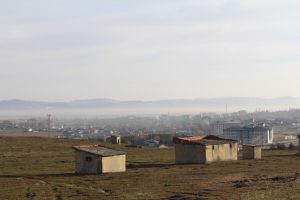 It is cold and rain is threatening again, the land there is over 2000 meters high. Hitchhiking is still not easy, traffic is really low. Turkey has however good reputation and is supposed to be easy to cross. Maybe recent events like the referendum, and military and economic tensions changed people’s behaviour. Police presence is important here and we cross 4 police check points between Posof and Erzurum.
It is cold and rain is threatening again, the land there is over 2000 meters high. Hitchhiking is still not easy, traffic is really low. Turkey has however good reputation and is supposed to be easy to cross. Maybe recent events like the referendum, and military and economic tensions changed people’s behaviour. Police presence is important here and we cross 4 police check points between Posof and Erzurum.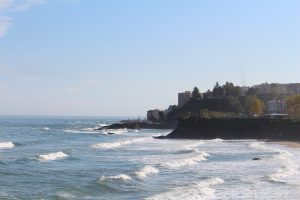 In Tirebolu the rain doesn’t want to stop. But luck comes back and we are hosted by buildings’ workers in their camp. They offer us beds, tea and food with broad smiles and laughing about how crazy we are. In the morning after our goodbyes to the team and their cat we move toward Samsun. We find there an host on Couchsurfing, a young director of a metalurgical company and we taste together some Börek, Pide and Ayran with a view on the black sea.
In Tirebolu the rain doesn’t want to stop. But luck comes back and we are hosted by buildings’ workers in their camp. They offer us beds, tea and food with broad smiles and laughing about how crazy we are. In the morning after our goodbyes to the team and their cat we move toward Samsun. We find there an host on Couchsurfing, a young director of a metalurgical company and we taste together some Börek, Pide and Ayran with a view on the black sea.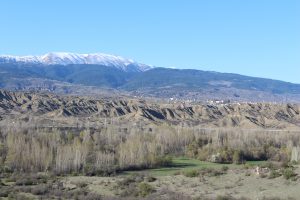 Later a truck driver offers us a really good meal, as if prepared by a Chef along the road with his gas cookers. We are happy to eat a proper meal…
Later a truck driver offers us a really good meal, as if prepared by a Chef along the road with his gas cookers. We are happy to eat a proper meal…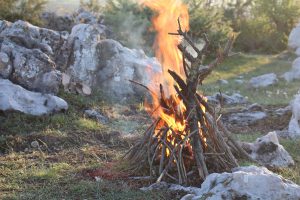 We arrive quickly to Istanbul and we sit a few hours on the Bosphorus side, between Beşiktaş and Bebek. The city is warmed up by the sun and it’s a nice moment to finish this trip.
We arrive quickly to Istanbul and we sit a few hours on the Bosphorus side, between Beşiktaş and Bebek. The city is warmed up by the sun and it’s a nice moment to finish this trip.